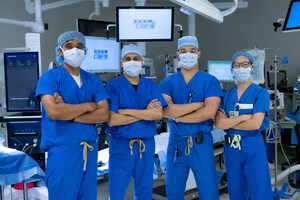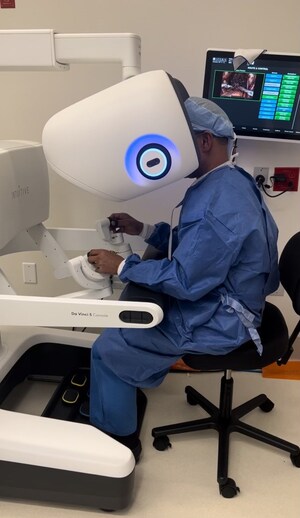The Cold Hard Truth about Staying Warm during the Super Bowl: Tips from Hackensack University Health Network
HACKENSACK, N.J., Jan. 29, 2014 /PRNewswire-USNewswire/ -- January 2014 will go down as one of coldest months in years. Even parts of the country known for their mild winters have experienced the arrival (and return) of arctic chill. At Hackensack University Health Network in northern New Jersey, we are experts in helping people deal with the cold. In fact, we were chosen as one of the NY/NJ Super Bowl Host Committee's official medical services providers for Super Bowl XLVIII, the first ever to be held outdoors in an icy, cold-weather city.
(Photo: http://photos.prnewswire.com/prnh/20140129/DC55526)
Since extreme cold can be a serious health hazard, the Hackensack University Health Network Emergency Services team will be on-site at MetLife Stadium this Sunday. In case of emergency, we'll be providing fans with high-quality care from our special Mobile Satellite Emergency Department (MSED), a state-of-the-art mobile hospital created via a unique collaboration with the U.S. Department of Defense and the Urban Area Security Initiatives. This is the first time a facility like this has been at a major sporting event.
Hackensack University Health Network includes the flagship Hackensack University Medical Center, HackensackUMC Mountainside and HackensackUMC at Pascack Valley. Together, they serve our communities with pride featuring award winning patient-centered care, education, research, and community outreach programs. As the closest trauma center to MetLife Stadium, HackensackUMC is one of only 10 state designated trauma centers - the only Level-II Trauma Center in Bergen County.
While the region is gearing up for Super Bowl XLVIII, Hackensack University Health Network is preparing its emergency services resources to care for the hundreds of thousands of visitors coming into town. The weather is sure to play a major part in everyone's plans. As we know, New Jersey can get very cold in February. Hackensack University Health Network offers these tips for staying warm and healthy:
Wear warm clothing and dress in layers. Whether you are at the Super Bowl or experiencing the cold weather, protect yourself by wearing layers. Wear a warm coat, hat and scarf. Wear mittens, which are warmer than gloves and don't forget waterproof footwear.
Dangers of prolonged exposure to the cold. Cold weather can also aggravate serious health issues, such as asthma. People who aren't dressed properly for extremely cold temperatures or who have reduced blood circulation are especially at risk for frostbite and hypothermia.
Frostbite
Frostbite causes loss of feeling, pain and color in the nose, ears, cheeks, chin fingers or toes. Frostbite can permanently damage the body and severe cases can lead to amputation. The risk of frostbite is increased in people with reduced blood circulation and among people who are not dressed properly for extreme cold temperatures.
At the first signs of redness or pain in any skin area, get out of the cold or protect any exposed skin. Any of the following signs may indicate frostbite:
- a white or grayish-yellow skin area
- skin that feels unusually firm or waxy
- numbness
A victim can often be unaware of frostbite until someone else points it out because the frozen tissues are numb especially those imbibing in alcoholic beverages.
Hypothermia
When exposed to cold temperatures, your body begins to lose heat faster than it can be produced. Prolonged exposure to cold will eventually use up your body's stored energy. The result is hypothermia, or abnormally low body temperature. Body temperature that is too low affects the brain, making the victim unable to think clearly or move well. This makes hypothermia particularly dangerous because a person may not know it is happening and won't be able to do anything about it. Warning signs of hypothermia include:
- shivering
- exhaustion
- confusion
- fumbling hands
- memory loss
- slurred speech
- drowsiness
If you or someone you are with has any of these symptoms, seek medical care right away.
Be mindful of your alcohol intake. Alcohol causes your body to lose heat more quickly in cold weather. It clouds your judgment. Excessive alcohol can lower your blood pressure and your body temperature. Shivering, confusion and feeling sleepy are common signs, so be sure to limit your consumption.
About Hackensack University Medical Center's NJ-MSED (Mobile Satellite Emergency Department) Units
An added level of emergency care and medical services for players, staff and fans during Super Bowl XLVIII, Hackensack University Medical Center's NJ-MSED (Mobile Satellite Emergency Department) Units will be at MetLife Stadium the week of January 26th through game day to provide high-quality mobile healthcare, if needed.
The NJ-MSED vehicles are one of only a few mobile medical assets of their kind in the nation, funded through a unique partnership with the U.S. Department of Defense and the Urban Areas Security Initiative (UASI). The core of the NJ-MSED complex exists in the form of two 43-foot trailers and a 48-foot trailer with expandable sides. Each mobile unit is staffed by HackensackUMC emergency physicians, nurses and operations personnel, and includes:
- Seven critical care beds with monitor-defibrillator capability
- Digital X-ray and sonography systems
- Telemedicine capabilities
- Portable field laboratory
- A pharmaceutical cache
- Overhead medical procedure lighting
- Oxygen generators and
- Technology to seamlessly connect the operations of the two units
Past deployments of the NJ-MSED vehicles include Hillsborough and Brick, New Jersey during Hurricane Sandy.
Also on standby during Super Bowl events will be Hackensack University Health Network's state-of-the-art helicopter, AirMed One. The helicopter, which first became operational in April of 2012, has since completed more than 260 patient flights since.
In addition, HackensackUMC recently unveiled the completion of phase one of the Emergency and Trauma Center renovation and expansion project. HackensackUMC treats more than 111,000 patients every year, making the hospital one of the busiest Emergency and Trauma Centers in the state of New Jersey.
"Having the Super Bowl in this highly populated area requires highly skilled medical expertise," said Joseph Feldman, M.D., chairman of Emergency Medicine, HackensackUMC. "Our world-class emergency staff, coupled with the expansion and renovation of our ETC and the deployment of our MSED units to MetLife Stadium ensures we are fully prepared to handle all medical and emergency needs during this historic event. When it matters most, we are prepared to keep the region healthy and safe."
About Hackensack University Medical Center
HackensackUMC, a nonprofit teaching and research hospital located in Bergen County, NJ, is the largest provider of inpatient and outpatient services in the state. Founded in 1888 as the county's first hospital, it is the flagship hospital of Hackensack University Health Network, one of the largest health networks in the state comprised of 1,140 beds, nearly 10,000 employees and 2,200 credentialed physicians. HackensackUMC was listed as the number one hospital in New Jersey and one of the top three New York metro area hospitals in the U.S. News & World Report's Best Hospital rankings for 2013-14. It also received 10 national rankings in: Cancer; Cardiology & Heart Surgery; Ear, Nose & Throat; Gastroenterology & GI Surgery; Geriatrics; Neurology & Neurosurgery; Orthopedics; Pulmonology; Urology; and the Joseph M. Sanzari Children's Hospital ranked as one of the Top 50 Best Children's Hospitals for Neurology and Neurosurgery in the 2013-14 Best Children's Hospitals list. The children's hospital is housed with the Donna A. Sanzari Women's Hospital in the Sarkis and Siran Gabrellian Women's and Children's Pavilion, which was designed with The Deirdre Imus Environmental Center using the highest "green building" standards, and was included on the Green Guide's list of Top 10 Green Hospitals in the U.S. HackensackUMC is among Healthgrades® America's Best 100 Hospitals in five different areas – more than any other hospital in the state, is one of Healthgrades America's 50 Best Hospitals™ for seven years in a row, and received the Healthgrades Distinguished Hospital Award for Clinical Excellence™ 12 years in a row. The medical center has also been named a Leapfrog Top Hospital, and received 22 Gold Seals of Approval™ by the Joint Commission – more than any other hospital in the country. It was the first hospital in New Jersey and second in the nation to become a Magnet® recognized hospital for nursing excellence; receiving its fifth consecutive designation in 2014. HackensackUMC is the Hometown Hospital of the New York Giants and the New York Red Bulls, and remains committed to its community through fundraising and community events. To learn more, visit: www.HackensackUMC.org.
SOURCE Hackensack University Medical Center
WANT YOUR COMPANY'S NEWS FEATURED ON PRNEWSWIRE.COM?
Newsrooms &
Influencers
Digital Media
Outlets
Journalists
Opted In





Share this article